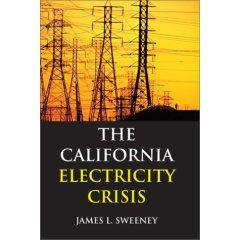| 2020ok Directory of FREE Online Books and FREE eBooks |
Free eBooks > Nonfiction > Government > Public Policy > The California Electricity Crisis
The California Electricity Crisisby James L. Sweeney  Download Book (Respecting the intellectual property of others is utmost important to us, we make every effort to make sure we only link to legitimate sites, such as those sites owned by authors and publishers. If you have any questions about these links, please contact us.) link 1 About Book Book Description Since the spring of 2000, energy problems have plagued California. Californians have faced blackouts, seen the state budget surplus disappear, watched Pacific Gas and Electric file for bankruptcy, and listened to state officials point fingers at many organizations and individuals for allegedly causing the crisis. The chain of events began as an opportunity for California to restructure and improve its electricity system. But after political leaders mismanaged the electricity crisis, California now faces an electricity blight while it struggles to recover from its self-imposed wounds. The California Electricity Crisis focuses on policy decisions, their consequences, and alternatives: the saga California has faced and is still facing. Throughout this saga, one policy decision led logically to another, yet at almost every juncture very different choices were possible. James L. Sweeney examines how the opportunity for restructuring was turned into risk, how challenges of increased demand for electricity and escalating wholesale costs were mishandled, and how the growing crisis ultimately turned into disaster. He documents how the California governor and legislature responded to the short-term crisis by adopting ill-conceived long-term measures—creating a harmful legacy for decades to come. But Professor Sweeney also shows how the state can still move past its difficulties by improving electricity markets, reducing risk, and appropriately managing the state's financial obligations. From the Publisher Since the spring of 2000, energy problems have plagued California. Californians have faced blackouts, seen the state budget surplus disappear, watched Pacific Gas and Electric file for bankruptcy, and listened to state officials point fingers at many organizations and individuals for allegedly causing the crisis. The chain of events began as an opportunity for California to restructure and improve its electricity system. But after political leaders mismanaged the electricity crisis, California now faces an electricity blight while it struggles to recover from its self-imposed wounds. The California Electricity Crisis focuses on policy decisions, their consequences, and alternatives: the saga California has faced and is still facing. Throughout this saga, one policy decision led logically to another, yet at almost every juncture very different choices were possible. James L. Sweeney examines how the opportunity for restructuring was turned into risk, how challenges of increased demand for electricity and escalating wholesale costs were mishandled, and how the growing crisis ultimately turned into disaster. He documents how the California governor and legislature responded to the short-term crisis by adopting ill-conceived long-term measures—creating a harmful legacy for decades to come. But Professor Sweeney also shows how the state can still move past its difficulties by improving electricity markets, reducing risk, and appropriately managing the state’s financial obligations. James L. Sweeney of Stanford University is a professor of management science and engineering, senior fellow of the Stanford Institute for Economic Policy Research (SIEPR), and senior fellow at the Hoover Institution on War, Revolution and Peace. His professional activities focus on economic policy and analysis, particularly energy, natural resources, and the environment. Related Free eBooks
| Related Tags |












SEND A COMMENT
PLEASE READ: All comments must be approved before appearing in the thread; time and space constraints prevent all comments from appearing. We will only approve comments that are directly related to the article, use appropriate language and are not attacking the comments of others.